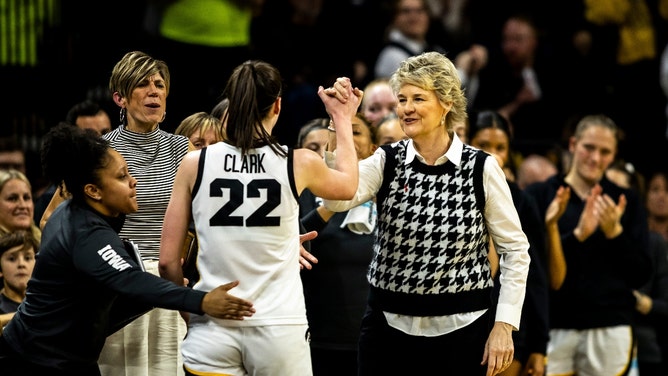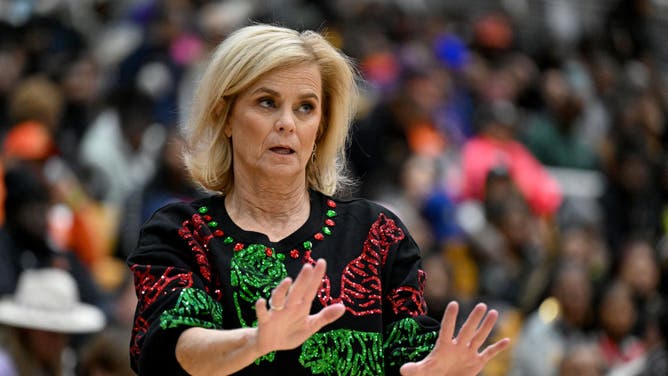Mansplaining: Lisa Bluder's And Kim Mulkey's Takes On Pete Maravich Are Sexist
What's a guy got to do here?
On a truly great day in women's basketball history, … wait. Back up.
On a truly great day in basketball history, Iowa women's coach Lisa Bluder chose to be dismissive of the monster Pistol Pete Maravich record that Iowa's iconic superstar Caitlin Clark had just smashed in Iowa's 93-83 win Sunday over Ohio State in Iowa City.
This was a 54-year-old record that many thought and wrote would never be broken along the lines of Ted Williams batting .406 and Joe Dimaggio's 56-game hitting streak in Major League Baseball in 1941, Wilt Chamberlain scoring 100 points in an NBA game in 1962 and Cal Ripken's consecutive MLB games played streak of 2,632 through 1998.

Caitlin Clark broke Pete Maravich's career scoring record of 3,667 points on Sunday. (Getty Images).
Maravich scored 3,667 points in three seasons from 1967-70 at LSU without the 3-pointer in 83 games.
Clark scored 18 in the first half Sunday to get to 3,668 points to break Maravich's NCAA Division I career scoring record, covering males and females. She is at 3,685 now entering the No. 2 seed Hawkeyes' (26-4, 15-3) next game. That will be in the Big Ten Tournament Friday in Minneapolis (6:30 p.m., Big Ten Network) vs. either 10-seed Wisconsin (13-15, 6-12) or 7-seed Penn State (18-11, 9-9).
Yes, Clark needed four seasons and 130 games to do it. But no one - man or woman - got close in four seasons over half a century until she did this season. That is extremely significant.
"Yeah, it really is," Bluder said when first asked about the achievement. "They used to call her Ponytail Pete when she was a little kid. And now she has the record. It's ironic."
Iowa Coach Lisa Bluder Was Asked To Compare Records
But she was asked again about the record of the late great Pete Maravich.
"When you look at what Caitlin did today versus the other records she set in recent days, does this one stick out in terms of what this is going to do for women's sports moving forward?"
Good question. It made sense because Clark had just broken Kansas' Lynette Woodard's pre-NCAA career scoring record of 3,649 points set from 1977-81 on Feb. 28. And before that, Clark broke Washington's Kelsey Plum's NCAA career scoring mark of 3,527 points from 2013-17 on Feb. 15.
But Bluder's anti-male antenna was apparently up.
"You know, I hope it advances women's sports even more," she said. But there was a but, and here it comes.
"But to me, you don't have to break a man's record to be recognized," she said. "You don't have to do that."
What?
And then she downshifted to the previous women's record.
"I think breaking Lynette's record was significant," she said.

LSU's Pistol Pete Maravich averaged 44.2 points a game over 83 games in three seasons from 1967-70. (Photo by Rich Clarkson/NCAA Photos via Getty Images)
So the Maravich mark wasn't?
"And, so, to me, eh," she said of the Sunday Maravich record.
Excuse me, did you just say the dismissive, ‘Eh?’"
How disrespectful! Maravich gets an "Eh!"
"You know, I mean, I admire Pistol Pete, but at the same time, I just don't want that to be the bar for women's athletics," she said.
Maybe, you should go to a bar, Lisa. It's been a wild season, and it's not over yet.

Iowa coach Lisa Bluder high-fives Iowa superstar Caitlin Clark during Sunday's game in which Clark broke Pete Maravich's career scoring record. (Getty Images).
It doesn't matter what anyone wants the bar to be. The bar is the bar. And the scoring bar in basketball - for men and women - is Pete Maravich and Caitlin Clark. Period.
Clark collected many headlines and attention when she broke Plum's and Woodard's records. Did Bluder forget that?
Yes, Clark breaking the Maravich record did garner more media attention and overall trending than the previous two. But that's partly because it was the NEXT record, not necessarily because it was the next MAN record. Man alive! It's about the points. Not the gender. If a Division I women's player had more points than Maravich, that would have been next in a future Clark game.
Now, yes, Maravich's record was much more well known nationally than was Plum's or Woodard's, partly because he was a man. But more so because the men's game was much bigger than the women's game when Maravich played half a century ago. The NCAA didn't even recognize women's basketball as a sport until 1982.
Women's Game Has Come So Far, So Quit Whining
It's not like that now. The women's game has clearly been bigger and better than the men's game since the Final Four last year when Clark exploded onto the scene and led Iowa's upset of No. 1 South Carolina at the Final Four in a national semifinal. OutKick, by the way, has decided to cover the women's tournament more this year than the men's. The Iowa-Ohio State game Sunday on FOX destroyed many a men's game in the ratings. Men's games in the NBA, that is.
The women's game has a legitimate, iconic star in Clark. The men do not have anyone close to Clark. Ever heard of Tommy Bruner? He leads the men's game in scoring with 24.5 points a game for Denver in the Summit League.
So, why, are you still carrying the torch against the men and complaining, Coach Bluder? You're winning. Your player just outscored one of the greatest players EVER! Enjoy it for crying out loud.
The attention Sunday was clearly not just because Maravich was a man. It was also because he transcended the game from 1967-70. There was nothing and no one like him. Clark averages 32.3 points a game now. USC's JuJu Watkins is less than five behind that at 27.8. When Maravich averaged 44.5 points a game in 1969-70, Kentucky great Dan Issel was more than 10 behind at 33.9 a game.
Maravich was a revolutionary, double-generational college player and cultural phenomenon. He averaged 43.8, 44.2 and 44.5 points in his career by season. The only other player in history to average 40 or more was Frank Selvy at 41.7 for Furman in 1953-54. Most leading scorers before and since Pistol Pete were out of bullets in the 20s of averages.
Maravich was ahead of his time like no other. The closest to an heir apparent did not arrive for 10 years by the name of Magic Johnson.
And all she can say to that is, "Eh."
Really?
That sounds pretty sexist to me, Coach Bluder.

LSU women's coach Kim Mulkey was growing up in Hammond, Louisiana, when Pete Maravich became an iconic superstar at LSU from 1967-70. (Photo by G Fiume/Getty Images)
LSU Coach Kim Mulkey Delivers ‘MAN’ Comment
Then LSU coach Kim Mulkey echoed Bluder's comment on Sunday.
"Pete Maravich could do things with a basketball that I had never seen done in my life," Mulkey said after her team's win over Kentucky in the Pete Maravich Assembly Center in Baton Rouge. "He was ahead of his time."
But she had a but, too.
"I don't look at comparing apples to oranges," she said. "What Clark has done is unbelievable, and her name will be right up there at the top. But he played over here with no three-point line for three years. And I don't think we need to make too much of, ‘Oh, she passed him because he’s a MAN."
Again, it was the 3,667 that got everybody saying, "Oh, she passed him." Not so much so because he was a MAN.
It would have been sexist by male journalists to simply not write about Clark breaking Maravich's record because Clark was beneath Maravich, which is what many fans and writers have been saying. Is that what Bluder and Mulkey would have preferred? Just ignore it because Clark's a woman? Many male writers have shown non-sexism by praising Clark for breaking Maravich's record, and Bluder and Mulkey are complaining about that?
Or ignore Clark's accomplishment because it was "apples and oranges?" It's the same sport. Women's and men's coaching records have been lumped together like the Clark and Maravich records for years by male journalists, including at NCAA.com. Duke men's coach Mike Krzyzewski passed Tennessee women's coach Pat Summitt's win record of 1,098 in 2018. And Stanford women's coach Tara VanDerveer passed Krzyzewski's 1,202 total this season and is at 1,212.
Perhaps sometimes everyone needs to relax their antenna. That way you don't pick up something that is not there.
Bluder and Mulkey were both guilty of reverse sexism.
But maybe I'm wrong. After all, I am a MAN.
OutKick's Womansplainer Weighs In
So, I went to the expert - OutKick's own Womansplainer columnist Amber Harding. I sent her the Bluder and Mulkey quotes.
"I didn't see one person saying it was a big deal because it was a man's record," Harding told me. "Actually, that never even crossed my mind, until you mentioned it. It sounds like a reporter got this idea then asked Bluder and Mulkey about it."
That last part is partly true. The reporter at the Iowa game Sunday did ask (above) Bluder to compare Clark breaking Maravich's record to the previous women's records. But judging from her answer above, it sure reads like she didn't just come up with that thought on the spot. Because her anti-man antenna was up.
Mulkey was only asked for her general thoughts on Clark breaking the record of the man whose name is on the building in which her team just played. And obviously her antenna was up, too.
"I don't have any great insight here except that I agree with you," Harding said.
And that's good enough for me.
Now, let's all keep those antennas down every now and then.